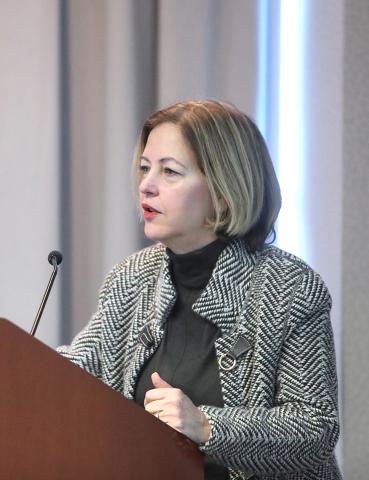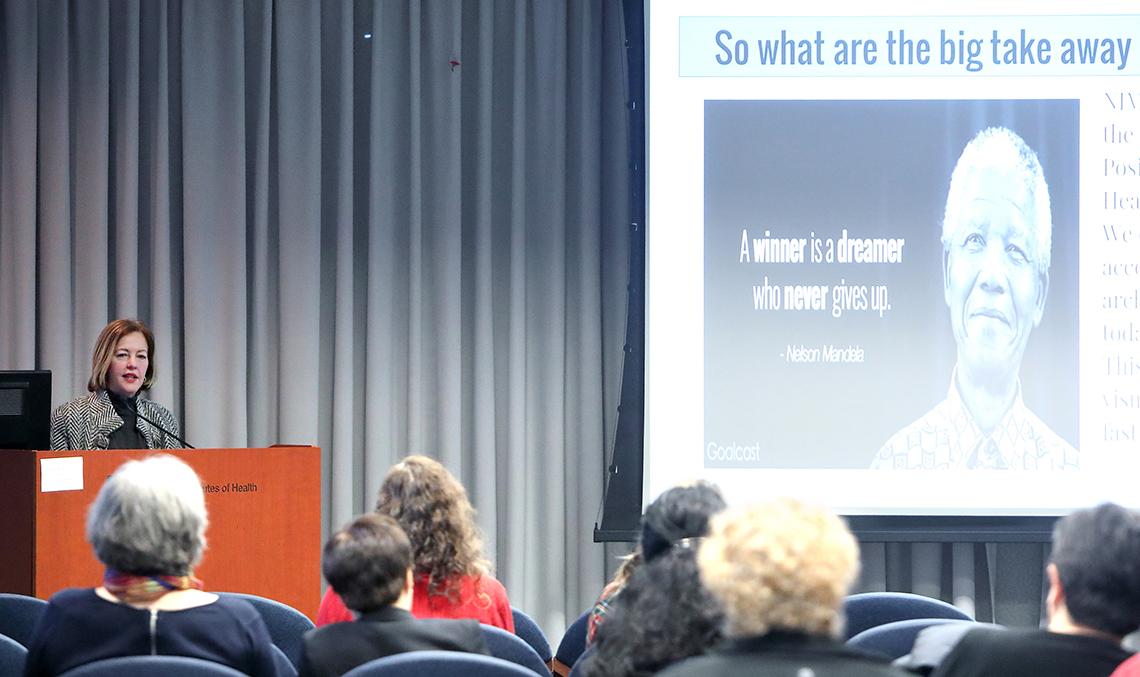Increasing Access to Mental Health Requires Action

Photo: Chia-Chi Charlie Chang
Dr. Margarita Alegría envisions a country where everyone who needs mental health services gets them—a system that is available 24/7, where walk-ins are welcomed, clients have a menu of treatment options to choose from and where retention in care is paramount.
Furthermore, youth services are prioritized and providers are given enough time to connect with their clients and interested in them. Peer support and recovery coaches are connected from the start and disparities have been eliminated. Patients trust their providers; services are brought to where people congregate, work or live; and employers facilitate their employees receiving services. Interventions are focused on communities to build social ties and social capital.
“We have a lot of knowledge of what we need to do and how to do it, but we’re missing the action,” said Alegría, chief of the disparities research unit at Massachusetts General Hospital and a professor in the departments of medicine and psychiatry at Harvard Medical School. She spoke at a recent NIMH Director’s Innovation Speaker Series lecture at the Neuroscience Center.
Those who need mental health services most aren’t getting the care they need, she said. The current system focuses solely on those who proactively seek treatment, rather than those needing care but not seeking it. The cost of finding effective, culturally congruent care and getting to and from a treatment location are barriers.
If everyone gets the service they need, the field will require a larger workforce for a nation that needs healing, Alegría said. In the U.S., there are immigrants with advanced health care degrees from other countries who do not have licenses to practice medicine. She proposed inviting immigrants who have medical, nursing, psychology and other health professional degrees to get accelerated training and supervision to obtain a license to practice in the U.S., without having to start all over again. Some patients, she noted, are more willing to work with professionals who speak the same language and come from the same culture they do, which is another reason for welcoming trained professionals from foreign lands.
Alegría also suggested establishing a millionaire’s tax to fund the necessary expansion and investment in mental health services, like California’s Proposition 68. Services funded by the tax succeeded in reducing homelessness, incarceration and hospitalization among people with mental illness and improved well-being of people served by the programs.
She also suggested that health care professionals develop a smartphone app like Uber—but for obtaining mental health care services. Uber is a ride-hailing app that connects users with drivers on demand. The mental care app would connect the approximately 120,000 community health workers with people who need mental health services at any time of the day. Psychiatrists and psychologists would supervise the community health workers offering this care.
Telemedicine might also help to eliminate mental health disparities and get more services to rural communities. Alegría said people who go without mental health services often move out of the areas where they get treatment. Many times, a patient begins a treatment, moves, then stops treatment. Being tele-assisted by phone rather than coming to clinic allows patients to continue care when and where it’s convenient for them.

Photo: Chia-Chi Charlie Chang
Providers “could get continuous coaching to improve clinical and interpersonal skills, update knowledge, practice shared decision-making, reduce bias, discrimination and stereotypes and empower the patient.” They need opportunities to reflect on how they treat their patients and correct their treatment approaches, if necessary, said Alegría. When caregivers listen to their patients and practice shared decision-making, she said, trust increases between provider and patient, making it our best chance at personalized medicine.
Right now, said Alegría, many mental health professionals practice based on their own opinions and gut feelings, rather than paying attention to patients’ needs. She believes that sometimes providers treat patients based on what they felt more comfortable doing, rather than working with the patient to develop personalized treatments.
After finishing treatment, she recommends that patients work with recovery coaches who understand that most mental illnesses are “chronic diseases, where you get better, but you also get worse.”
Alegría will soon publish results from her Boricua Youth Study, which seeks to understand the experiences of Puerto Ricans in Puerto Rico and in the rest of the U.S. The study examines the effects of acculturation and environment on mental health outcomes.
Going forward, Alegría believes experts must study the influence of neighborhoods on mental health. By studying the conditions where people live, work, study and socialize, researchers can learn how these variables affect people’s mental health. Based on the results, policymakers and payors can allocate resources more efficiently.
“We’ve been focused too much on changing behavior of our patients and too little on changing behavior of our systems,” Alegría concluded.
